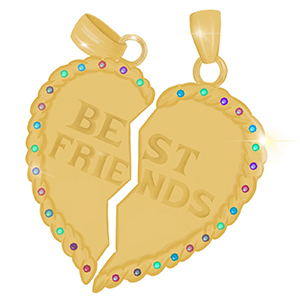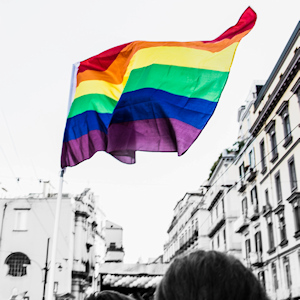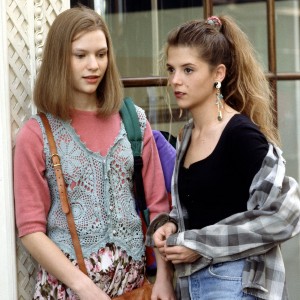
About the Book
-
Author:
- Tom Lennon
- Genre:
- Contemporary
Cover Story: I’ll Give You a Pass Just This Once, Book Cover.
BFF Charm: Yay?
Swoonworthy Scale: -5
Talky Talk: Spell It Out For Me
Bonus Factor: LGBTQ
(Anti) Bonus Factor: 90s
Relationship Status: It Gets Better
Cover Story: I’ll Give You a Pass Just This Once, Book Cover.
[Ed. note: Cover Story was based on the ARC cover.]

This is one of my least favorite book covers, which we see time and time again. It’s so ubiquitous that Lee and I even mocked it in our very first FYA post. GET SOME NEW MATERIAL, COVER DESIGNERS.
However, I’ll let this one go ONLY on the grounds that this is a lgbtq teen book originally written in the early 1990s. As such, it is rather noteworthy from a historical YA perspective. This book took something fairly stigmatized at the time – especially in Ireland, where it is set – and stuck it in a typical YA setting. Given the context, that’s kind of a big deal, which is why I’ll allow this new twist on a tired cover.
The Deal
In 1993, Neil Byrne is about to graduate secondary school with the world at his feet. Top marks in school, rugby star, popular, and good-looking, Neil should be living it up in his last summer before college. But instead, he is spending his summer struggling with loneliness and depression.
Neil has known he was gay since age 10 or 11, but he’s been keeping that on the DL from his friends and family. But as he’s about to go off to college, he decides to start confronting his sexuality, seeking out the Dublin gay scene, going on dates, and coming out to a select few people. But even as he’s becoming more comfortable in his own skin, Neil can’t stop his overwhelming feelings of self-loathing and isolation.
BFF Charm: Yay?

I’m not sure “yay” is the right sentiment here so much as “for the love of God, Neil, get some some decent friends! And also probably some extensive psychiatric help while you’re at it.” Neil is a really good kid, but he is horribly lonely and desperate. And for good reason! Everyone around him is either homophobic or treats him as their pet gay, like the local gay bar is a dog park and he’s an excuse to go be voyeur to all the doggies playing fetch, in some sort of misguided and offensive social anthropological study. I’m not even sure which subset is worse.*
What Neil needs is a friend who just. doesn’t. care. about his sexuality, but does care about his mental health. Someone who will tell him that it’s perfectly normal to be gay, but what’s not normal is all these suicidal thoughts so maybe let’s focus on that. Also please dump your boyfriend because he is terrible.
I don’t particularly want to be that someone, because it’s a lot of pressure. But Jesus, somebody needs to step in here.
*This is false. The homophobes are definitely worse.
Swoonworthy Scale: -5
Oof. Y’all. This book was so hard to read. Neil has three primary love interests, all of which made me uncomfortable in different ways.
The first is Ian, an unrequited crush at school. Neil’s behavior towards Ian is teenage-obsessive bordering on stalker territory in a way that is totally relatable, but nonetheless squirm-inducing.
Next is “Uncle Sugar,” a sad, older gentleman that Neil meets his first night in a gay bar. Uncle Sugar made me sick to my stomach. To explain why I found this relationship so incredibly disturbing, let’s just flip this around and pretend you’re reading a book about a lonely, insecure, teenage girl who gets chatted up by a middle aged man at a bar. He repeatedly tries (and succeeds) to get her drunk, and then propositions her with things like inviting her back to his place to watch porn. Also, he sometimes drives by her house at night. How would you feel about that book?
Last is Shane, a super-mega-foxy-awesome-hot recent law graduate that Neil starts dating. There are some tingly moments when the first get together, but their relationship soon turns sour.
I found it really depressing that there are no positive relationships in this book, but it is also sadly, painfully realistic–not just for a gay teen in early 90s Dublin, which must have been pretty isolating, but for a lot of lonely teenagers, regardless of background, gender, or sexuality.
Talky Talk: Spell it out for me.
So much of this book takes place in Neil’s head, which is a really dark, emo place filled with Sinéad O’Connor lyrics. The overall effect is depressing but powerful. My only real complaint was that Lennon tended to beat his points to death, especially in the first half of the book. For instance:
Neil struggled to fight back the tears of pride. But he felt uneasy as he turned to show the crystal bowl to his admirers. Would their adulation be so enthusiastic if they knew the truth about him? What would they be shouting at him then?
It feels a little forced, like Lennon is standing next to me while I read saying, “Do you get it? People wouldn’t like him if they knew he was gay because they are bigoted, you see.” And I’m like, “Yeah, thanks Tom. I got it. No really. Go away now.” A little more subtlety would have been nice. Admittedly, I don’t know how much of that perspective is informed by my being a) an adult reader and b) 20 years in the future, where homosexuality in books and in general public discourse is more common. I’m willing to give the book the benefit of the doubt there.
Also, readers of FYA! I need your input on something. At one point in the book, a relatively minor character called Daphne retorts,
“Sticks and stones may break my bones, but whips and chains excite me.”
To which I said, “QUOI LE QUOI?!!?!?” Because this book was written a full 17 years before “S&M” was released. Internetz, answer this question for me! Is this a thing? Like, have people been saying this for years and I’m just oblivious? Or have people not been saying this for years and it’s just a freaky coincidence/hijacking that this line cropped up in a Rihanna song two decades after this book was published? Help me out because I NEED TO KNOW.
Apologies for the interruption. We will now resume your regularly-scheduled programming.
Bonus Factor: LGBTQ

Obviously, homosexuality is central to this book. But more than just being an issue book, I thought Lennon dealt with the subject matter in a realistic and representative way, particularly for the early nineties. Even the most liberal, rainbow-flag waving, GSA-attending, pot-smoking hippy types are kind of bigots. Take Neil’s sister, who at first seems totes ok with with Neil’s sexuality:
Jackie admitted to Neil that she didn’t mind gay blokes but that lesbians gave her the creeps. Neil didn’t bother to argue with her, realizing that if he wasn’t gay, he’d probably have the same reaction to gay blokes.
Even the gay characters in this book are varying degrees of judgemental and homophobic toward their peers. None of this hypocrisy is directly addressed in the course of the story, which I actually appreciated. It’s depressing, but also fairly realistic, and helped keep the story from turning into a Lesson Book, which is almost never a good thing.
(Anti) Bonus Factor: 90s

Ok, so normally I’m all about the 90s as a bonus factor, because HELLO. NINETIES. Sinéad O’Connor! Doc Martens! Flannel! But damn, this was a dismal setting for a book. The only thing that managed to be a bigger downer than the AIDS epidemic was the plague of bigotry and hate crimes painting the backdrop for this story.
Relationship Status: It Gets Better
Book, I wish I had a Delorean and a puffy vest so that I could take you twenty years in the future and prove to you that it gets better. In the two decades since you were written, so much has happened. Today, people write books about gay characters all the time. Sometimes sexuality is important to the story, and other times–and this is my favorite thing, book–there are gay characters but it’s not even a thing that is acknowledged as important to the narrative. Can you imagine in your day, if there were characters just casually being gay, as if it were as noteworthy as a character having brown hair or being left-handed? The world is an amazing, ever-evolving place, and you will not always feel this alone.
I’m not going to lie to you, though. We still have a really, ridiculously long way to go before people are picking up books irrespective to whether they’re marketed as a “gay book” or a “girl book” or a “teen book,” or going to see movies based on whether they “identify” with some superficial quality of main character. But it’s books like you that help change things, and for that, I just want to give you a big, puffy-vested bear hug.
FTC Full Disclosure: I received my review copy from Albert Whitman & Company. I received neither money nor cocktails for writing this review (dammit!). When Love Comes to Town is available now .